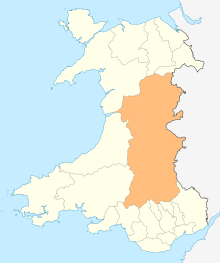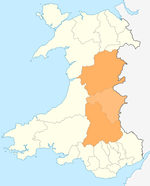Machynlleth
Machynlleth (pronounced [maˈχənɬɛθ] (![]()
| Machynlleth | |
|---|---|
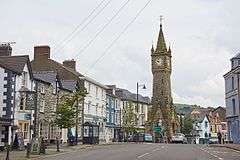 The Clock Tower | |
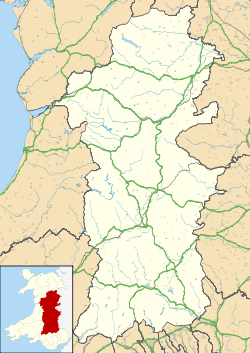 Machynlleth Location within Powys | |
| Population | 2,235 (2011)[1] |
| OS grid reference | SH745005 |
| Community |
|
| Principal area | |
| Ceremonial county |
|
| Country | Wales |
| Sovereign state | United Kingdom |
| Post town | MACHYNLLETH |
| Postcode district | SY20 |
| Dialling code | 01654 |
| Police | Dyfed-Powys |
| Fire | Mid and West Wales |
| Ambulance | Welsh |
| UK Parliament | |
| Senedd Cymru – Welsh Parliament |
|
Machynlleth was the seat of Owain Glyndŵr's Welsh Parliament in 1404,[4] and as such claims to be the "ancient capital of Wales". However, it has never held any official recognition as a capital. It applied for city status in 2000 and 2002, but was unsuccessful. It is twinned with Belleville, Michigan.
Machynlleth hosted the National Eisteddfod in 1937 and 1981.
History
There is a long history of human activity in the Machynlleth area. In the late-1990s, radiocarbon dating showed that copper mining was taking place in the Early Bronze Age (c. 2,750 years ago), within a mile of the town centre.
There are legends of a once fertile plain, the Cantre'r Gwaelod, now lost beneath the waves of Cardigan Bay.
The Romans settled in the area; they built a fort at Pennal (Cefn Caer) four miles west of Machynlleth, and are reputed to have had two look-out posts above the town at Bryn-y-gog and Wylfa, and another fort, called Maglona, at Machynlleth.[5] One of the earliest written references to Machynlleth is the Royal charter granted in 1291 by Edward I to Owen de la Pole, Lord of Powys. This gave him the right to hold "a market[4] at Machynlleth every Wednesday for ever and two fairs every year". The Wednesday market is still a busy and popular day in Machynlleth 700 years later.
The Royal House, which stands on the corner of the Garsiwn, is another of the mediaeval houses that can still be seen today. According to local tradition, Dafydd Gam, a Welsh ally of the English kings, was imprisoned here from 1404 to 1412 for attempting to assassinate Owain Glyndŵr. After his release by Glyndŵr, ransomed Gam fought alongside Henry V at the Battle of Agincourt and is named amongst the dead in Shakespeare's Henry V. The name Royal House undoubtedly refers to the tradition that Charles I stayed at the house in 1643.
The weekly market and biannual fair thrived, and in 1613 drew complaints from other towns whose trading in cloth was being severely affected. A document dated 1632 shows that animals for sale came from all over Merionethshire, Montgomeryshire, Cardiganshire, Carmarthenshire and Denbighshire, and prospective buyers came from Flintshire, Radnorshire, Brecknockshire, Herefordshire and Shropshire, in addition to the above.
The Dyfi Bridge (Welsh: Pont ar Ddyfi) was first mentioned in 1533, by Geoffrey Hughes, "Citizen and Merchant taylour of London" who left £6 13/4 "towards making of a bridge at the toune of Mathanlleth". By 1601 "Dovey bridge in the Hundred of Mochunleth" was reported to be insufficient, and the current one was built in 1805 for £250. Fenton describes it in 1809 as "A noble erection of five large arches. The piers are narrow and over each cut-water is a pilaster, a common feature of the 18th century".
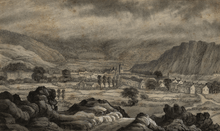
Rowland Pugh was the Lord of Meirionedd,[6] and lived at Mathafarn about two miles east of Machynlleth. Pugh supported the Royalist side in the English Civil War. On 2 November 1644, Sir Thomas Myddleton of Chirk Castle was marching on Machynlleth with a force of the Parliamentarian army, when he was ambushed by a force organised by Pugh. In retaliation for the attack, Myddleton burned down Mathafarn on 29 November 1644, along with a number of houses in Machynlleth.[7]
Laura Ashley's first shop was opened in Machynlleth (at 35 Maengwyn Street).
The disappearance of April Jones in October 2012 received a large amount of coverage in the UK media.
Plas Machynlleth, the Londonderry family and the Clock Tower


Mary Cornelia, the daughter of local landowner Sir John Edwards married Viscount Seaham, the second son of the third Marquess of Londonderry, in 1846 and they set up home in Plas Machynlleth. He became Earl Vane on the death of his father and the fifth Marquess on the death of his half-brother.
To celebrate the 21st birthday of their eldest son, Viscount Castlereagh, the townspeople subscribed to the erection (at the town's main road intersection) of the clock tower, which has become widely known as the symbol of Machynlleth. The tower, which stands on the site of the old town hall, is the first thing many visitors will notice. The foundation stone was laid on 15 July 1874 amid great festivities.
Another son, Lord Herbert Vane-Tempest, was the last member of the family to live at the Plas and was killed in the Abermule train collision on the Cambrian Railways, of which he was a director.
The house was given to the townspeople in December 1948 under the stewardship of the then Machynlleth Urban District Council.
Celtica
Various local government re-organisations saw responsibility for the Plas pass first to Montgomeryshire District Council, who in 1995 converted it into the Celtica Visitor Centre. Celtica interpreted the history and culture of the Celts with a walk-through audio-visual exhibition housed in a purpose-built addition to the house. The £3 million attraction was part-funded by the European Union. The centre had a high-profile in the Welsh media, with opera singer Bryn Terfel officially opening the attraction in October 1995.
Powys County Council took over Celtica and the house when it was formed as a unitary authority in 1997. The centre was successful in attracting tourist, school groups and conferences for a number of years, however initial visitor number predictions proved to be too ambitious and the council was unwilling to prolong its subsidy and with little scope for alternative investment Celtica closed in March 2006, and the house stood empty while Powys County Council sought to relinquish responsibility for it in line with their policy of selling many of their publicly owned buildings.
At this point, Machynlleth Town Council, realising that the town was in danger of losing the Plas house and grounds, which they saw as belonging to the community in the spirit of the 1948 bequest, began discussions with Powys Council with a view to the Town Council taking ownership of the Plas. On 1 April 2008, in a move thought to be unprecedented for a community council of its size, Machynlleth Town Council took ownership of the Plas and its parkland and facilities. It has reopened the restaurant by leasing it to a local licensee and the 1st and 2nd floors of the main building are rented out as office space. Medium-sized meeting rooms and conference space are also offered for hire.
Transport links
From 1859 to 1948 the town was served by the narrow gauge Corris Railway, which brought slate from the quarries around Corris and Aberllefenni for onward despatch to the markets. The railway's Machynlleth station building, built in 1905, can still be seen alongside the road approaching the town from the north.
Machynlleth main-line station was built by the Newtown and Machynlleth Railway, and continues to provide a link to Aberystwyth and the Cambrian coast to the west and Newtown and Shrewsbury to the east. Services were operated by Arriva Trains Wales and subsequently are operated by Transport for Wales.
Machynlleth is served by two TrawsCymru long distance bus routes. The T2 connects the town with Bangor to the north and continues to Aberystwyth (where connections can be made to South Wales). There is also the T12 which runs to Wrexham via Newtown - this is branded as TrawsCymru Connect.
Machynlleth is home to the signalling centre that controls the European Rail Traffic Management System (ERTMS) on the Cambrian Line. The system went into full operational use in March 2011.
Welsh language
Machynlleth retains its strong Welsh character, with Welsh spoken alongside English. The 2011 Census indicated that 67% of the population have some knowledge of Welsh, with 39% able to read, write and speak the language.[8]
Owain Glyndŵr
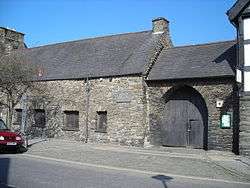
Machynlleth has a special role in Welsh history because of its connection with Owain Glyndŵr, a Prince of Wales who rebelled against the English during the reign of King Henry IV. Owain was crowned Prince of Wales in 1404 near the Parliament House, which is one of three mediaeval houses in town, in the presence of leaders from Scotland, France and Spain, and he held his own Parliament in the town. He held his last parliament in the nearby village of Pennal, by the Church of St Peter ad Vincula. It is thought that after the rebellion floundered, Owain went into hiding in the area around Machynlleth.
Tourism
Tourism is the primary employment sector with a range of activity based attractions (for example several mountain biking trails) as well as the visitor centre at the Centre for Alternative Technology. Agriculture continues to play a significant part in the make-up of the town and surrounding area. Another important local industry and employer is the renewable energy sector. The area has a wind farm at Cemmaes. The area now has a rapidly expanding renewable energy industry with several small to medium-sized companies now operating in or around the town.
The town has a market on Wednesdays which includes traditional Welsh, Spanish and French food stalls.
The town has hosted the Machynlleth Comedy Festival annually since May 2010, featuring comedians such as Jon Richardson, Pappy's, Josie Long, Stewart Lee and Richard Herring. The festival dominates the town for a weekend, with events running over three days in nine venues.[9]
Machynlleth lies on Glyndŵr's Way and the Dyfi Valley Way, two long-distance footpaths.
MoMA Wales
Machynlleth is the home of the Museum of Modern Art (MoMA), Wales. It originated in 1986 as Y Tabernacl, a centre of performing arts in an old chapel, a private initiative by former journalist Andrew Lambert. In 1994 this was expanded with a new complex of art galleries, a recording studio and a language laboratory.[10] Lambert had previously tried to convert the town's old railway station into a hotel and museum, employing international architect Richard Rogers.[10]
MoMA Wales hosts the annual Machynlleth Festival, as well as its own annual open exhibition of art.[11]
Environment
Machynlleth is the home of Ecodyfi, a locally controlled organisation that was set up to foster and support a greener community and economy in the Dyfi Valley.[12]
The Centre for Alternative Technology is based in a disused quarry three miles from Machynlleth.
In December 2019 Machynlleth council was the first in Wales to declare a climate emergency.[13][14][15][16]
Governance
Machynlleth has a town council, elected from the ward, with fourteen councillors.[17]
The ward elects a county councillor to Powys County Council, though the current county councillor, Michael Williams, was unopposed again at the May 2017 election. He had been elected unopposed since first winning the seat in 1980. He had also sat on the Machynlleth Town Council since 1974.[18]
In 2019, the town council became the first in Wales to formally support Welsh independence. [19]
Sport
Machynlleth Town Football Club, founded in 1885, plays in the Spar Mid-Wales district league and the reserve team is in the Cambrian Tyres Division 2 Amateur football league. The Machynlleth Rugby Club plays in the North Wales Division 2.
Notable people
- Nicky Arscott (born 1983), local artist and arts educator
- Laura Ashley (1925–1985), opened her first shop at 35 Maengwyn Street, Machynlleth, in 1961
- James Richard Atkin, Baron Atkin (28 November 1867 – 25 June 1944), lawyer and judge, Justice of the Peace in Machynlleth
- William David Davies, (18 January 1897 – 7 July 1969), Welsh Presbyterian minister and writer on theological topics, lived in Machynlleth
- John Evans (25 January 1816 – 25 August 1879), miner and political figure, born and educated in Machynlleth
- Gareth Glyn, (born 1951), Welsh composer and radio broadcaster, born in Machynlleth
- Owain Glyndŵr, (c. 1349 or 1359 – c. 1416), Welsh ruler and Prince of Wales, crowned in Machynlleth in 1404
- David Griffiths, (20 December 1792 – 21 March 1863), Welsh missionary and Bible translator to Madagascar, lived in Machynlleth from 1858 until his death
- Gwynn ap Gwilym, (1955–2016), Welsh language poet, novelist, editor and translator, raised in Machynlleth
- David Russell Hulme, (born 19 June 1951), Welsh conductor and musicologist, native of Machynlleth
- Emrys James, (1 September 1928 – 5 February 1989), Welsh Shakespearean actor, born in Machynlleth
- April Jones (2007–2012), child murder victim
- Edward Morgan Lewis, (25 December 1872, in Machynlleth – 23 May 1936 in Durham, New Hampshire), baseball player in U.S.
- George Monbiot, (born 27 January 1963), English writer, lived in Machynlleth for a number of years and still has a house and family there
- Geraint Lloyd Owen (born 1941), Welsh-language poet and teacher, taught at Machynlleth
- Jimmy Page and Robert Plant of Led Zeppelin commenced writing the album Led Zeppelin III at nearby Bron-Yr-Aur cottage
- Thomas Williams Phillips, (20 April 1883 – 21 September 1966), senior official in the British Civil Service, educated at Machynlleth County School
- Henry Rogers, (1806–1877), nonconformist minister and man of letters, died in Machynlleth
- Berta Ruck[20] (2 August 1878 – 11 August 1978), Welsh writer who grew up near Machynlleth
- Annie Morgan Suganami (born 1952), Welsh artist and musician
- Hywel Swrdwal, (fl. 1430–1475), Welsh language poet from Machynlleth
- Lord Herbert Vane-Tempest (1862–1921), Cambrian Railways director, of Machynlleth
- George Vane-Tempest, 5th Marquess of Londonderry, (26 April 1821 – 6 November 1884), aristocrat, businessman, diplomat and Conservative politician, lived in Machynlleth
- Charles Vane-Tempest-Stewart, 6th Marquess of Londonderry, (16 July 1852 – 8 February 1915), Conservative politician, landowner and benefactor, born in London and lived in Machynlleth
- Meri Wells (born 1946), ceramic sculptor, lives and works near Machynlleth
- Thomas Provis Wickham (born 1810 in Weymouth, Dorset; died on 1 March 1890 in Machynlleth), English cricketer
References
- "Machynlleth 2011". Retrieved 8 January 2018.
- "Machynlleth: the small market town where April Jones was abducted". The Daily Telegraph. 2 October 2012. Retrieved 30 April 2013.
- "Parish Headcounts: Powys". Neighbourhood Statistics. Office for National Statistics. Retrieved 24 December 2012.
- The Welsh Academy Encyclopaedia of Wales. John Davies, Nigel Jenkins, Menna Baines and Peredur Lynch (2008) pg527 ISBN 978-0-7083-1953-6
- Evan Jones (2009). A Portrait of Machynlleth and Its Surroundings. Coch Y Bonddu Books. pp. 1–. ISBN 978-1-904784-24-1.
- Skinner, John (1878). Archaeologia Cambrensis. Cambrian Archaeological Association.
- Morgan, Wendy (2003). Caeheulon and the Parish of Penegoes. Machynlleth: Coch-y-Bonddu Books.
- 2001 Census Neighbourhood Statistics: Machynlleth
- "Machynlleth Comedy Festival home page". Retrieved 2 May 2014.
- Rowan, Eric; Stewart, Carolyn (2002), "Conclusions", An Elusive Tradition: Art and Society in Wales 1870 – 1950, Cardiff: University of Wales Press, pp. 216–7, ISBN 0-7083-1769-3
- Whitfield, Paul; Le Nevez, Catherine; Stewart, Carolyn (2012), The Rough Guide to Wales, Rough Guides, p. 285, ISBN 978-1-405389815, archived from the original on 22 December 2014
- "If it's broken, fix it!". Cambrian News. Retrieved 4 March 2020.
- "UK Parliament declares climate emergency". BBC News. 1 May 2019. Retrieved 4 March 2020.
- Turney, Chris. "UK becomes first country to declare a 'climate emergency'". The Conversation. Retrieved 4 March 2020.
- "It's the climate emergency, stupid". GOV.UK. Retrieved 4 March 2020.
- "The U.K. Has Officially Declared a 'Climate Emergency'". Time. Retrieved 4 March 2020.
- Rachel Flint (1 June 2017). "Mayor and new Machynlleth council take a bow". Cambrian News. Retrieved 21 January 2018.
- Rachel Flint (2 May 2017). "Uncontested council election seats 'mockery of democracy'". BBC News. Retrieved 21 January 2018.
- Gedge, Anthony. "Machynlleth first town to back Welsh independence". Retrieved 4 June 2020.
- "machynlleth people". www.machynlleth.info. Retrieved 4 March 2020.
External links
| Wikimedia Commons has media related to Machynlleth. |

- 2001 Census Neighbourhood Statistics: Machynlleth
- Photos of Machynlleth and surrounding area on Geograph
- The Eco Dyfi website
| Preceding station | Following station | |||
|---|---|---|---|---|
| Terminus | Corris Railway | Ffridd Gate | ||
| Preceding station | Following station | |||
| Transport for Wales Cambrian Line | ||||

